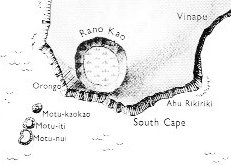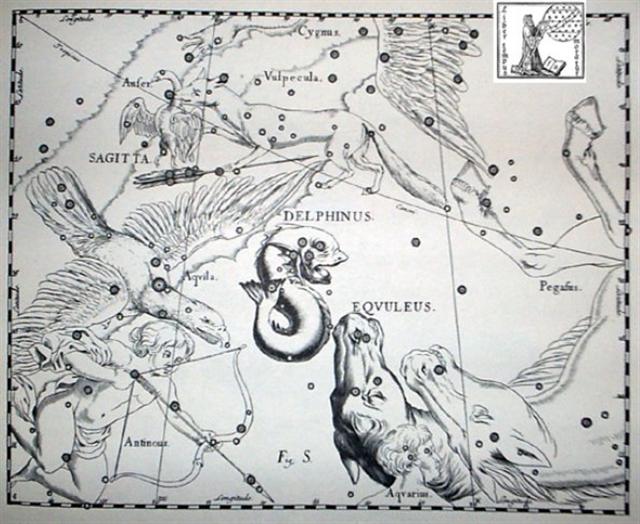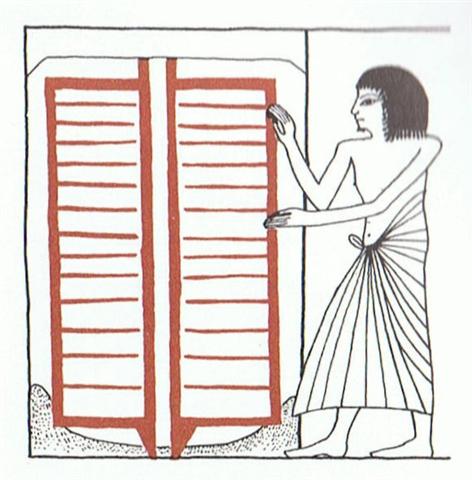We have to pay
attention not
only to
correspondences
and to opposites but
also to
sequences.
Before arriving
to Te Pei
(Canopus) and
Te Pou
(Sirius) the
dream soul went
to Te Piringa
Aniva:
... The dream soul
went on and came to
Te Piringa Aniva.
She named the place
'Te Piringa Aniva
A Hau Maka O Hiva'.
Again the dream soul
went on her way and
reached Te Pei.
She named the place
'Te Pei A Hau
Maka O Hiva'.
The dream soul went
on and came to Te
Pou. She named
the place 'Te Pou
A Hau Maka O Hiva'
...
Barthel:
... 1. Hanga Te
Pau, the landing
site of Ira
and his band of
explorers, is the
natural anchorage
for those
approaching
Vinapu by sea.
The remarkable stone
fronts of the ahu
of Vinapu are
all facing the sea.
The explorers landed
at Hanga Te Pau
during the month 'Maro',
that is, June
...

2. The cult place of
Vinapu is
located between the
fifth and sixth
segment of the dream
voyage of Hau
Maka. These
segments, named 'Te
Kioe Uri'
(inland from
Vinapu) and 'Te
Piringa Aniva'
(near Hanga Pau
Kura) flank
Vinapu from both
the west and the
east. The decoded
meaning of the names
'the dark rat'
(i.e., the island
king as the
recipient of gifts)
and 'the gathering
place of the island
population' (for the
purpose of
presenting the
island king with
gifts) links them
with the month 'Maro',
which is June. Thus
the last month of
the Easter Island
year is twice
connected with
Vinapu. Also,
June is the month of
summer solstice [a
mistake: south of
the equator it is
winter solstice],
which again points
to the possibility
that the Vinapu
complex was used for
astronomical
purposes.
3. On the 'second
list of place
names', Hanga Te
Pau is called
'the middle (zenith)
of the land' (he
tini o te kainga).
This may refer to a
line bisecting the
island, but it can
just as easily mean
the gathering of a
great number (of
islanders). The
plaza (130 x 130
meters) would have
been very well
suited for this
purpose
...
|
Tini
To be at the
zenith:
ku-tini-á te
raá;
middle of a
journey, of
a period of
time; te
tini o te
raá, the
middle of
the day.
Vanaga.
1. A great
number,
innumerable,
infinite,
indefinite.
Tinitini,
million,
billion. T
Pau.:
tinitini,
innumerable.
Mgv.:
tini, a
countless
number,
infinite.
Mq.: tini,
id. Ta.:
tini,
numerous. 2.
Raa tini,
noon;
tini po,
midnight;
te tini te
raa,
zenith;
topa tini,
abortion.
Churchill. |
In
rongorongo times the
dark June solstice
occurred 3-4
days before the Sun
had reached Canopus
(Te Pei):
 |
 |
|
Ga1-30 |
Ga2-1 |
|
APRIL 20
(*30) |
21 (111) |
|
Furud
(94.9) |
Well-22 |
|
δ
Columbae
(95.2),
TEJAT
POSTERIOR,
Mirzam
(95.4),
CANOPUS
(95.6),
ε
Monocerotis
(95.7),
ψ1
Aurigae
(95.9) |
|
June 23
(6 * 29
= 174) |
ST
JOHN'S
EVE |
|
'May 27
(7 * 21
= 147) |
28 (*68) |
|
NAKSHATRA
DATES: |
|
OCTOBER
19 (292) |
20
(*213) |
|
Purva
Ashadha-20 |
|
KAUS
MEDIUS,
κ Lyrae
(277.5),
Tung Hae
(277.7) |
KAUS
AUSTRALIS
(278.3),
ξ
Pavonis
(278.4),
Al
Athfar
(278.6) |
|
December
23
(*277) |
CHRISTMAS
EVE |
|
'November
26
(*250) |
27 |
|
Piri
1. To
join
(vi,
vt); to
meet
someone
on the
road;
piriga,
meeting,
gathering.
2. To
choke:
he-piri
te gao.
3.
Ka-piri,
ka piri,
exclamation:
'So
many!'
Ka-piri,
kapiri
te pipi,
so
many
shellfish!
Also
used to
welcome
visitors:
ka-piri,
ka-piri!
4.
Ai-ka-piri
ta'a
me'e
ma'a,
expression
used to
someone
from
whom one
hopes to
receive
some
news,
like
saying
'let's
hear
what
news you
bring'.
5.
Kai
piri,
kai piri,
exclamation
expressing:
'such a
thing
had
never
happened
to me
before'.
Kai
piri,
kai
piri, ia
anirá
i-piri-mai-ai
te me'e
rakerake,
such a
bad
thing
had
never
happened
to me
before!
Piripiri,
a slug
found on
the
coast,
blackish,
which
secretes
a sticky
liquid.
Piriu,
a tattoo
made on
the back
of the
hand.
Vanaga.
1. With,
and. 2.
A shock,
blow. 3.
To stick
close
to, to
apply
oneself,
starch;
pipiri,
to
stick,
glue,
gum;
hakapiri,
plaster,
to
solder;
hakapipiri,
to glue,
to gum,
to coat,
to
fasten
with a
seal;
hakapipirihaga,
glue. 4.
To
frequent,
to join,
to meet,
to
interview,
to
contribute,
to
unite,
to be
associated,
neighboring;
piri
mai,
to come,
to
assemble,
a
company,
in a
body,
two
together,
in mass,
indistinctly;
piri
ohorua,
a
couple;
piri
putuputu,
to
frequent;
piri
mai piri
atu,
sodomy;
piri
iho,
to be
addicted
to;
pipiri,
to
catch;
hakapiri,
to join
together,
aggregate,
adjust,
apply,
associate,
equalize,
graft,
vise,
join,
league,
patch,
unite.
Piria;
tagata
piria,
traitor.
Piriaro
(piri
3 -
aro),
singlet,
undershirt.
Pirihaga,
to ally,
affinity,
league.
Piripou
(piri
3 -
pou),
trousers.
Piriukona,
tattooing
on the
hands.
Churchill. |
Twins stick
(!) together:
... The old man
gave the Raven
two small
sticks, like
gambling sticks,
one black, one
multicoloured.
He gave him
instructions to
bite them apart
in a certain way
and told him to
spit the pieces
at one another
on the surface
of the sea. The
Raven climbed
back up the
pole, where he
promptly did
things
backwards, just
to see if
something
interesting
would occur, and
the pieces
bounced apart.
It may well be
some bits were
lost. But when
he gathered
what he could
and tried again
- and this time
followed the
instructions he
had been given -
the pieces stuck
and rumpled and
grew to become
the mainland and
Haida Gwaii.
The Gemini twins
may have been
named Pipiri
ma as I
seem to remember it from
somewhere.
"The Reverend
Mr. William
Ellis wrote, in
his
Polynesian
Researches,
that the natives
of those islands
knew the two
stars as Twins,
Castor being
Pipiri and
Pollux Rehua;
and the whole
figure Na
Ainanu, the
Two Ainanus, one
Above and the
other Below,
with a lengthy
legend attached;
but the Reverend
Mr. W. W. Gill
tells the same
story, in his
Myths and Songs
of the South
Pacific, as
belonging to
stars in
Scorpio."
(Allen)
Tuu ma Heke was
possibly equal
to Tuu
together with
the Octopus, and
Pipiri ma
could have been an
abridged form of
Pipiri ma
Rehua - the
addition of
Rehua not
being necessary
when
circumstances
made it clear
which the other
twin was.
Fact is, when
the Arrow
constellation
was seen in the
nakshatra sky
the Gemini
constellation
was at the Sun,
with Castor
rising
heliacally in
July 12 (193)
and Pollux 3
days later.

... A
man had a
daughter who
possessed a
wonderful
bow and
arrow, with
which she
was able to
bring down
everything
she wanted.
But she was
lazy and was
constantly
sleeping. At
this her
father was
angry and
said: 'Do
not be
always
sleeping,
but take thy
bow and
shoot at the
navel of the
ocean, so
that we may
get fire.'
The navel of
the ocean
was a vast
whirlpool in
which sticks
for making
fire by
friction
were
drifting
about. At
that time
men were
still
without
fire. Now
the maiden
seized her
bow, shot
into the
navel of the
ocean, and
the material
for
fire-rubbing
sprang
ashore.
Then the old
man was
glad. He
kindled a
large fire,
and as he
wanted to
keep it to
himself, he
built a
house with a
door which
snapped up
and down
like jaws
and killed
everybody
that wanted
to get in.
But the
people knew
that he was
in
possession
of fire, and
the stag
determined
to steal it
for them. He
took
resinous
wood, split
it and stuck
the
splinters in
his hair.
Then he
lashed two
boats
together,
covered them
with planks,
danced and
sang on
them, and so
he came to
the old
man's house.
He sang: 'O,
I go and
will fetch
the fire.'
The old
man's
daughter
heard him
singing, and
said to her
father: 'O,
let the
stranger
come into
the house;
he sings and
dances so
beautifully.'
The stag
landed and
drew near
the door,
singing and
dancing, and
at the same
time sprang
to the door
and made as
if he wanted
to enter the
house. Then
the door
snapped to,
without
however
touching
him. But
while it was
again
opening, he
sprang
quickly into
the house.
Here he
seated
himself at
the fire, as
if he wanted
to dry
himself, and
continued
singing. At
the same
time he let
his head
bend forward
over the
fire, so
that he
became quite
sooty, and
at last the
splinters in
his hair
took fire.
Then he
sprang out,
ran off and
brought the
fire to the
people.


I
have not abandoned
our trail, but it
was necessary to
make this long
detour before
beginning our
discussion of Delta
(δ
Andromedae):
|
Egyptian
door |
 |
Phoenician
dalet |
 |
Greek
delta |
Δ (δ) |
...
Delta
(uppercase
Δ,
lowercase
δ)
...
is
the
fourth
letter
of
the
Greek
alphabet.
In
the
system
of
Greek
numerals
it
has
a
value
of
4.
It
was
derived
from
the
Phoenician
letter
Dalet.
Letters
that
come
from
delta
include
Latin
D
and
Cyrillic
Д. A
river
delta
(originally,
the
Nile
River
delta)
is
so
named
because
its
shape
approximates
the
upper-case
letter
delta
(the
shape
is a
triangle)
...
Dalet
(dāleth,
also
spelled
Daleth
or
Daled)
is
the
fourth
letter
of
many
Semitic
alphabets
...
The
letter
is
based
on a
glyph
of
the
Middle
Bronze
Age
alphabets,
probably
called
dalt
'door'
(door
in
Modern
Hebrew
is
delet),
ultimately
based
on a
hieroglyph
depicting
a
door.

|
 |
 |
 |
 |
| Gb6-25 |
Gb6-26 (408) |
Gb6-27 |
Gb6-28 (181) |
|
JANUARY 15 (*300) |
16 |
17 |
18 (383) |
| θ Oct. (364.9) |
Al Fargh al Thāni-25 |
Uttara Bhādrapadā-27 / Wall-14 |
χ Pegasi (2.1), θ Andromedae (2.7) |
| 0h (365.25) |
| Caph, SIRRAH (0.5), ε Phoenicis, γ³ Oct. (0.8) |
ο Oct. (1.3), ALGENIB PEGASI (1.8) |
|
March 20 (444) |
0h |
22 |
23 (82) |
|
'February
21 (52) |
22 |
Terminalia |
24 (420) |
|
NAKSHATRA
DATES: |
|
JULY
17 |
18 |
19 (200) |
20 (*121) |
|
12h
(182.6) |
Alchita, Ma Wei (183.1), Minkar (183.7), ρ Centauri (183.9) |
Pálida (184.6), Megrez (184.9) |
Hasta-13 / Chariot-28 |
|
ο
Virginis
(182.1),
η
Crucis
(182.5) |
GIENAH (185.1), ε Muscae (185.2), ζ Crucis (185.4), Zaniah (185.9) |
|
September19 |
20 |
21 (264) |
Equinox |
|
'August
23 |
24 (236) |
25 (*157) |
26 |
 |
 |
 |
 |
| Gb7-1 (182) |
Gb7-2 |
Gb7-3 (413) |
Gb7-4 |
|
JANUARY 19 (384) |
20 |
21 |
22 |
| σ Andromedae (3.0), ι Ceti (3.3), ζ Tucanae (3.5), ρ Andromedae, π Tucanae (3.7) |
no star listed (4) |
Ankaa, κ Phoenicis (5.0) Alphard
|
λ Phoenicis (6.3), β Tucanae (6.4) |
| March 24 |
25 (84) |
26 (450) |
27 |
| 'February 25 |
26 (422) |
27 |
28 (59) |
| NAKSHATRA DATES: |
| JULY 21 |
7-22 |
23 (204) |
24 |
| Chang Sha (186.3) |
Intrometida (187.4), Acrux (187.5) |
γ Com. Berenicis (188.0), σ Centauri (188.1), Algorab (188.5), Gacrux (188.7) |
γ Muscae (189.0), Avis Satyra (189.3), Asterion (189.5), Kraz (189.7) |
| September 23 |
24 |
25 (268) |
26 |
| 'August 27 |
28 (240) |
29 (*108) |
30 |
 |
 |
 |
|
Gb7-5 |
Gb7-6
(416) |
Gb7-7
(188) |
|
JANUARY
23 |
24 |
25 (390) |
|
Andromeda
Galaxy,
π
Andromedae
(7.7) |
ε
Andromedae
(8.2),
Delta
(8.4),
Schedir
(8.6), ζ
Andromedae,
μ
Phoenicis
(8.9) |
ξ
Phoenicis
(9.0), ρ
Tucanae
(9.1),
Deneb
Kaitos,
η
Phoenicis
(9.4),
Al
Nithām
(9.6) |
|
March 28 |
29 (88) |
30 (454) |
|
'March 1
(60) |
2 |
3 |
|
NAKSHATRA
DATES: |
|
JULY 25 |
26 |
27 (208) |
|
α
Muscae
(190.2),
τ
Centauri
(190.5),
χ
Virginis
(190.7)
Alderamin |
Al
Áwwā'-11
/
Shur-mahrū-shirū-19 |
ι Crucis
(192.2),
β Muscae
(192.5),
Mimosa
(192.9) |
|
Sombrero
Galaxy
(191.1),
ρ
Virginis
(191.4),
PORRIMA,
γ
Centauri
(191.5) |
|
September
27 |
28 |
29 (272) |
|
'August
31 |
'September
1 |
2 (245) |
 |
 |
 |
 |
| Gb7-8 |
Gb7-9 |
Gb7-10 (420) |
Gb7-11 (192) |
|
JANUARY
26 |
27 (392) |
28 |
29 |
| Achird (10.7) |
Legs-15 |
Cih, λ Tucanae (12.4), φ³ Ceti (12.6), μ Andromedae (12.8) |
φ4 Ceti (13.2) |
| ν Andromedae (11.0), φ² Ceti (11.1), ρ Phoenicis (11.2), η ANDROMEDAE (11.4) |
|
March 31 (455) |
April 1 (91) |
2 |
3 |
|
'March 4 (428) |
5 (64) |
6 |
7 |
|
NAKSHATRA
DATES: |
|
JULY 28 |
29 (210) |
30 |
31 |
| no star listed (193) |
κ Crucis (194.4), ψ Virginis (194.5), μ Crucis, λ Crucis (194.6), Alioth, ι Octantis (194.8) |
Minelauva (195.1), Cor Caroli (195.3) |
δ Muscae (196.5), Vindemiatrix (196.8) |
|
September
30 (273) |
October 1 |
2 |
3 |
|
'September
3 (246) |
4 |
5 |
6 |
| |
|
Delta |
δ Andromedae |
8.4 |
March 29 (88) |
- |
- |
| 0 |
- |
Zero |
η Andromedae |
11.4 |
April 1 (91) |
- |
0 |
| 1 |
Al Sharatain |
Pair of Signs |
β Arietis (Sheratan), γ (Mesarthim) |
27.4 |
April 17 (107) |
16 |
16 |
| 2 |
Al Dabarān |
Follower |
α Tauri (Aldebaran), θ¹, θ²´, γ (Hyadum I), δ (Hyadum II), ε (Ain) |
63.4 |
May 23 (143) |
22 |
52 |
| 3 |
Al Hak'ah |
White Spot |
λ Orionis (Heka), φ¹, φ² |
83.4 |
June 12 (163) |
20 |
72 |
| 4 |
Al Han'ah |
Brand |
γ Gemini (Alhena), μ (Tejat Posterior), ν, η (Tejat Prior), ξ (Alzirr) |
93.4 |
June 22 (173) |
10 |
82 |
| 5 |
Al Dhirā' |
Forearm |
α Gemini (Castor), β (Pollux) |
113.4 |
July 12 (193) |
20 |
102 |
At the beginnning the Arab sequence of stations all have the right ascension fraction 0.4 and April 1 (at heliacal η Andromedae) was 11 days after 0h, similar to how January 1 (366) was 11 days after the December solstice (355).
Considering again the calendar date Tagaroa Uri 15 (288), we could say that 288 - 11 = 277 and then subtract a further 16 days before the relevant heliacal star became visible again. 277 - 16 = 261 = 9 * 29.
261 - 80 = *181 (cfr Gb6-28). Day 261 is September 18 and at the time of Taurus this date position was located at the Yed Door (δ and ε Ophiuchi), with the Hyades Gate in the nakshatra sky:
 |
 |
 |
|
 |
 |
| Gb5-8 |
Gb5-9 |
Gb5-10 |
Gb5-11 (135) |
Gb5-12 (365) |
| MARCH 17 |
18 |
19 (78) |
20 (444) |
0h |
| 4h (60.9) |
no star listed (61) |
Beid (62.2)
Vindemiatrix |
Al Dabarān-2 |
Hyadum II (64.2) |
| no star listed (60)
Cor Caroli |
HYADUM I (63.4) |
| May 20 |
21 |
22 (*427) |
23 |
24 (144) |
| 'April 23 (*33) |
24 |
25 (*400) |
26 (116) |
27 |
| NAKSHATRA DATES: |
| SEPTEMBER 16 |
17 |
18 (261) |
|
19 |
20 (*183) |
| 16h (243.5) |
ψ Scorpii (244.6), Lesath (244.8) |
χ Scorpii (245.1), Yed Prior, δ Tr. Austr. (245.5) |
Yed Posterior, Rukbalgethi Shemali (246.6). δ Apodis (246.7), ο Scorpii (246.8) |
Heart-5 |
| Acrab, Jabhat al Akrab (243.3), θ Lupi, Rutilicus (243.5), Marfik (243.7), φ Herculis (243.8) |
σ SCORPII (247.0), Hejian (247.2), ψ Ophiuchi (247.7) |
| November 19 |
20 |
21 (325) |
22 |
23 |
| 'October 23 (*216) |
24 |
25 |
26 |
27 (300) |
|













